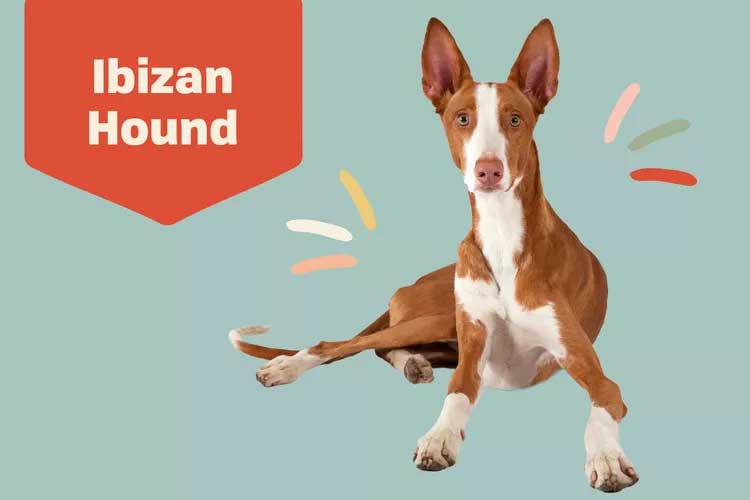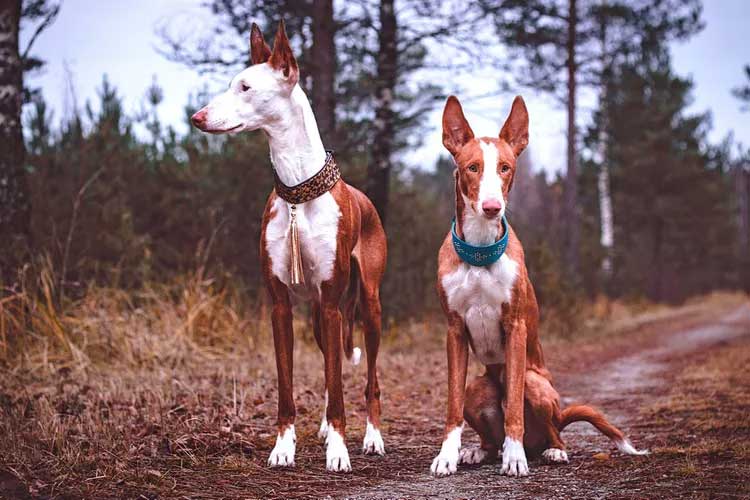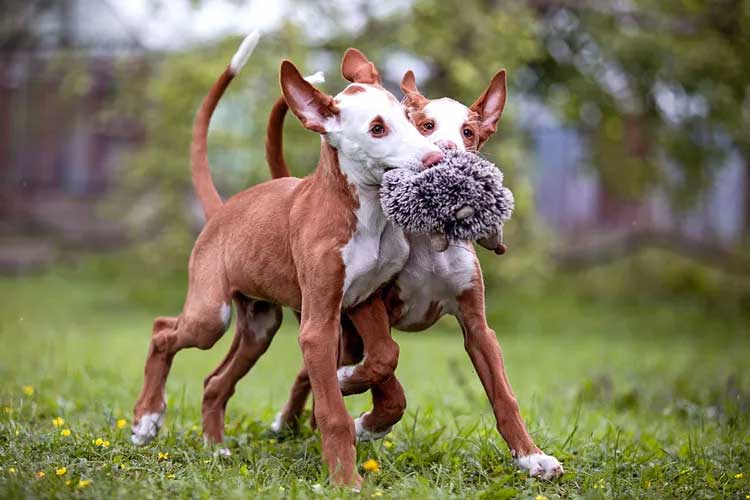As world-class sprinters, playful Ibizan hounds have energy to spare and do best in homes where they receive plenty of exercise and mental stimulation to suit their on-the-go personalities.

Ibizan Hound Overview
| OFFICIAL NAME | Ibizan Hound |
| COMMON NAME | Ibizan Hound |
| PET HEIGHT | 22 to 27 inches |
| PET WEIGHT | 45 to 50 pounds |
| LIFESPAN | 11 to 14 years |
| GOOD WITH | dogs, families |
| TEMPERAMENT | friendly, gentle, outgoing, playful |
| INTELLIGENCE | high |
| SHEDDING AMOUNT | infrequent |
| EXERCISE NEEDS | high |
| ENERGY LEVEL | active |
| VOCAL LEVEL | when necessary |
| DROOL AMOUNT | low |
| BREED GROUP | hound |
| BREED SIZE | medium (26-60 lbs.) |
| COAT LENGTH | short, wiry |
| COLORS | red, white |
| PATTERNS | bicolor |
| OTHER TRAITS | easy to groom, easy to train, good hiking companion, high prey drive, hot weather tolerant, loves water |
Lean and muscular, Ibizan hounds are ultra-athletic dogs who love to run and love spending time with their families even more. These red-and-white pups are thought to be one of the most ancient dog breeds in the world, with their slender forms and big ears appearing in Egyptian hieroglyphs before they made their way to Ibiza, the Spanish island from which they take their name.
In exchange for providing an active lifestyle, Ibizan hound parents are rewarded with an affectionate, playful companion.
Appearance
Ibizan hounds are medium-sized dogs that reach up to 27.5 inches tall and weigh up to 50 pounds.Their coats are short, come in either smooth or wire varieties, and are red, red and white, or white. Regal in appearance, Ibizans have lithe bodies and powerful limbs built especially for their favorite activity: running. Their narrow head is topped with large prick ears and small eyes in colors ranging from clear amber to caramel.

At first glance, these lanky red dogs might be confused with a Pharaoh hound. And while the dogs are similar in height, weight, and build, there are some differences between Ibizan hounds vs. Pharaoh hounds. For one, Pharaoh hound coats can be a range of chestnut, tan, and red golden, while the Ibizan colorway is strictly red and white. The Ibizan hound also stands a few inches taller than the average Pharaoh hound.
Temperament
Although the so-called "Beezers" were bred as hunting dogs, the breed isn't all work and no play. In fact, these dogs are known for being friendly, playful, and affectionate."This breed is outgoing, even-tempered, affectionate, loyal, and loves to be around its family," says Jerry Klein, DVM, chief veterinary officer for the American Kennel Club.
Ibizan hounds are adaptable to new situations but might need time to warm up to strangers, which often makes them good home alarm systems that will bark when something is amiss. Early socialization will help Ibizan hound puppies be more comfortable around new people as they grow.
These are active dogs that need a lot of exercise but shouldn't be left to entertain themselves in the backyard; when left to their own devices, they can become bored and find less-than-ideal ways to entertain themselves.
"This breed can jump up to 6 feet high," Klein says. "A tall and secure fence is important if your Ibizan hound is going to frequent the backyard."

Instead, Klein suggests spending time engaged in activities such as hiking, running, and swimming that will help tire out your Ibizan hound. But know that, thanks to their hunting background, Ibizan hounds retain their strong instinct to run and chase—and small animals may capture their attention.
But for all the love she has for heart-pounding cardio, an Ibizan hound's favorite activity just might be spending time with her owners.
Living Needs
The number one thing an Ibizan hound needs is an active home where there are plenty of opportunities for physical and mental stimulation. Space is less important and, with sufficient exercise, the breed will do well in an apartment.Ibizan hounds love spending time outdoors and make "great jogging companions," Klein says. They are adaptable to new situations, affectionate with their families, and tend to get along well with other dogs. But because she's a hunting breed, Ibizan hounds have strong prey drives and may chase smaller animals. But, Klein says, "Perhaps because of the sweetness of the breed, they are good with their own cats when raised with them."
Another factor to consider before bringing home an Ibizan hound puppy: Thanks to their high energy levels, they may overwhelm small children.
"It's key to teach young children in the home about being gentle and the proper way to interact with their canine companion," Klein says.
Care
Like all breeds, Ibizan hounds benefit from consistent positive reinforcement training. These sessions do more than teach dogs to come, sit, and stay: Training provides the mental stimulation that Ibizan hounds crave. Keep sessions short and fast-paced to keep her attention and offer lots of praise and rewards for her efforts. Training can be a positive way for her to burn her physical energy, too.When it comes to grooming, Ibizan hounds are a wash-and-go breed. Both smooth and wire varieties require minimal grooming—brush them once a week and bathe as needed to keep their coats looking good.
Klein says their grooming routine should include regular nail trims, ear cleanings, and routine dental care, including annual professional dental exams and cleanings.
Health
Ibizan hounds have a lifespan of 11–14 years. And, like all breeds, these pups are susceptible to certain health conditions.Klein recommends breeders screen Ibizan hound puppies to rule out deafness, eye disorders, and hip dysplasia. Prospective owners should ask their Ibizan hound breeder to document these screenings for common health issues.

As your Ibizan hound grows, here are three conditions to watch for:
Hip dysplasia: The hip joint and socket were designed to fit together for smooth movements. In Ibizan hounds with hip dysplasia, the pieces don't fit quite right and can cause a painful grinding in the joint, leading to lameness. There is no cure for the degenerative disease but physical therapy and anti-inflammatory medications can help; in some cases, surgery may also be necessary.
Autoimmune thyroiditis: Considered the most common cause of hypothyroidism, the disease is diagnosed when the immune system attacks the thyroid gland, causing symptoms ranging from fatigue, lethargy, and weight gain to increased shedding or hair loss and cold intolerance. Autoimmune thyroiditis often affects Ibizan hounds between the ages of two and five. The Ibizan Hound Club of the United States (IHCUS) recommends a blood test every year to test for the condition.
Congenital deafness: Ibizan hounds are among the breeds that can be diagnosed with congenital deafness in one or both ears. Intrauterine infections, liver disorders, toxic exposures, and certain drugs and genetics can all cause the condition. The symptoms, including ignoring cues, unusual vocalizations and jumping or snapping in surprise when touched, are often noticed a few weeks after birth. Ibizan hounds diagnosed with congenital deafness can be trained using hand signals.
History
The Ibizan hound earned its moniker for the region of Ibiza, an island off the coast of Spain, where the breed was developed. It's believed that Phoenician traders brought hounds to the island as early as the 8th century, according to the IHCUS. Ibizan hounds may be related to Pharaoh hounds and their likeness is often seen in ancient Egyptian art.Ibizan hounds are believed to be one of the oldest purebred dogs. Spanish farmers were instrumental in developing the breed, creating future generations that excelled as athletic, tireless hunters. They were used as rabbit hunters (but were also known to hunt larger game, including deer) and proved invaluable in helping feed their island families.
The rabbit dogs weren't brought to the U.S. until 1956. Although the AKC recognized the breed in 1978, these rabbit hunters remain rare.
Fun Facts
A statue of Anubis, the "watchdog of the dead," found in the tomb of Tutankhamun, is believed to be an Ibizan hound, according to the IHCUS.The Ibizan hound debuted at the Westminster Kennel Club Dog Show in 1980.
Ibizan hounds sometimes hunted alongside ferrets, which were used to flush rabbits from their dens.